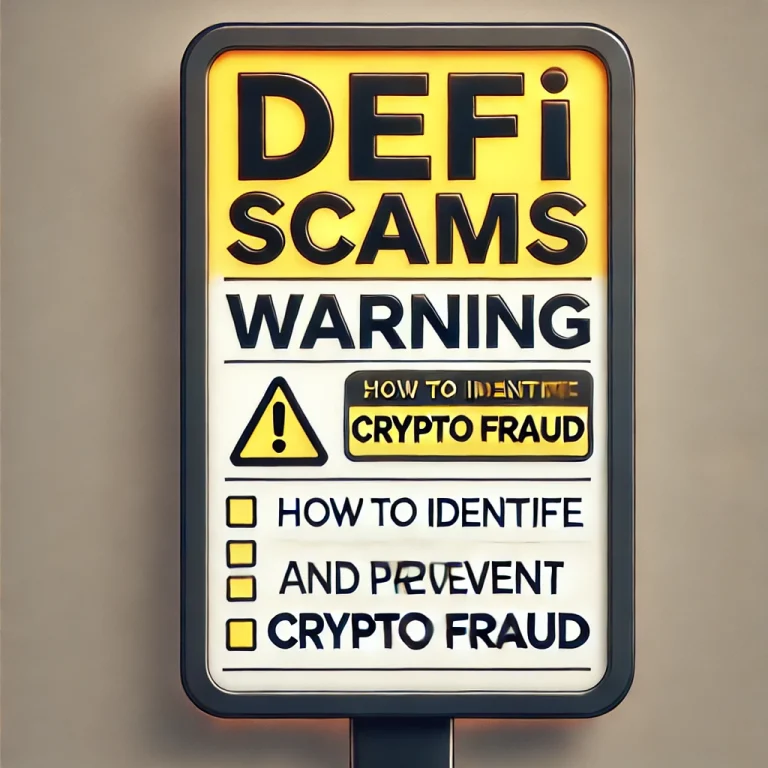Why Are Cryptocurrency Scams on the Rise?
According to Chainalysis 2024 Report, cryptocurrency scams resulted in over $10 billion in losses in 2023, marking a 35% increase compared to the previous year. Fraudsters are leveraging the decentralized nature of cryptocurrencies to design sophisticated scams, leaving many investors with devastating financial losses.
Have you ever seen social media ads promising “guaranteed 10% daily returns” on crypto investments? Or has someone told you that sending a small amount of cryptocurrency will unlock a bigger reward? These are likely crypto scams!
This article will introduce the latest cryptocurrency scam tactics of 2025 and provide practical prevention strategies to help you safeguard your investments.
1. The Latest Cryptocurrency Scam Tactics in 2025
1.1 Fake Investment Schemes: Ponzi Schemes & Rug Pulls
Case Study: Fintoch Scam
Fintoch claimed to be a DeFi (Decentralized Finance) project backed by JPMorgan, promising 1% daily returns to investors. However, in May 2023, the development team disappeared with $31 million, leaving investors with nothing.
How to Identify?
- Verify the team background: Legitimate DeFi projects openly share team details and have verifiable LinkedIn profiles.
- Check for audit reports: Reliable projects undergo security audits by firms like CertiK.
- Beware of unrealistic returns: Any project that guarantees “high returns with no risk” is likely a scam.
1.2 Fake Exchanges & Scam Apps
Case Study: 2023 “Fake Binance” Scam
Scammers created a fake Binance website and developed fraudulent apps that tricked users into entering their private keys or seed phrases, ultimately stealing their funds. Over $12 million was lost due to this scam.
How to Identify?
- Download apps from official sources: Always use Apple App Store or Google Play to install crypto exchange apps.
- Verify the website URL: Ensure you’re visiting the official domain, such as binance.com.
- Never share private keys: Legitimate exchanges never ask for your private keys or seed phrases.
1.3 Social Engineering Scams (Celebrity Scams & Fake Customer Support)
Case Study: Elon Musk Bitcoin Giveaway Scam
Scammers impersonated Elon Musk on Twitter (now X), promoting fake Bitcoin giveaways that required users to send a small amount of crypto to “unlock rewards.” Once transferred, the funds were never returned.
How to Identify?
- Celebrities do not give away free crypto. Any “limited-time offer” is likely a scam.
- Check account verification. Look for the blue checkmark and review past posts.
- Avoid clicking suspicious links. Phishing links can steal your wallet information.
1.4 Web3 & DeFi Scams (Smart Contract Exploits)
Case Study: Euler Finance Hack (2023)
Hackers exploited a vulnerability in Euler Finance’s smart contract, stealing $197 million in crypto assets. While some funds were later recovered, investors suffered significant losses.
How to Identify?
- Use audited DeFi platforms that have undergone security reviews by CertiK, PeckShield, or OpenZeppelin.
- Be cautious with wallet permissions. Use Rabby Wallet to manage permissions securely.
- Analyze smart contracts using blockchain tools like Etherscan or Nansen.
2. How to Prevent Cryptocurrency Scams Effectively?
2.1 Develop Strong Security Habits
- Use hardware wallets (e.g., Ledger or Trezor) to protect against hacks.
- Enable Two-Factor Authentication (2FA) to secure exchange accounts.
- Stay informed about new scams to avoid falling victim.
2.2 Use Technology to Prevent Scams
- Track suspicious transactions with Etherscan or Nansen.
- Use ScamSniffer, a tool that detects phishing websites and prevents wallet authorization fraud.
2.3 Understand Legal Regulations
- SEC (U.S. Securities and Exchange Commission): Increasing crypto market regulations, with multiple fraud cases prosecuted in 2024.
- MiCA (EU’s Markets in Crypto-Assets Regulation): Requires crypto projects to disclose legal compliance information transparently.
Stay Vigilant and Avoid Crypto Scams!
Cryptocurrency scams in 2025 are becoming more sophisticated, but with good security habits, advanced tools, and legal knowledge, you can protect yourself.
If you found this article helpful, please share it with your friends and leave a comment below! Have you ever encountered a crypto scam? How did you handle it?







